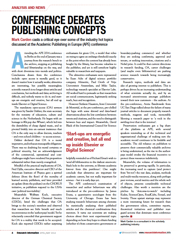Conference debates publishing concepts
Mark Carden casts a critical eye over some of the industry hot topics discussed at the Academic Publishing in Europe conference

Attending the APE 2014 conference in Berlin at the end of January was a journey from the research bench to the archive, stopping at publishing and librarianship on the way, and with short diversions into morals and politics. Conclusions drawn from the conference include: open access is morally good, so it doesn’t matter how it actually works; altmetrics are interesting, but possibly meaningless; scientific research is no longer about articles and conclusions, but methods and data; archiving is difficult, and nobody wants to do it; and start-ups are energetic and creative, but all end up inside Elsevier or Digital Science.
The mandatory open-access (OA) sermon was given by Sander Dekker, the state secretary for the ministry of education, culture and science in the Netherlands. He began with an homage to 80s pop duo Wham!, which led into the desirability of cheap digital music, and so pivoted briskly into an earnest insistence that OA is the only way to allow doctors, teachers – and even school children – to access science.
Dekker declared that OA is a moral imperative, and is thus an inescapable obligation. There was no doubting his moral certainty or political sincerity, but an acknowledgement of the commercial, operational and cost-challenges might have rendered his proposition substantial rather than merely evangelical.
Mindful of the practical implications of OA, Fred Dylla, executive director and CEO of the American Institute of Physics gave a spirited defence (from the floor) of the morality of learned society publishers, and later provided an update (from the podium) on the CHORUS initiative, as publishers respond to the USA’s own ‘political inevitability’.
Meanwhile Wolfram Koch, executive director of the German Chemical Society (GDCh), listed the challenges that OA brings to the society’s members and observed that researchers see little benefit and much inconvenience in the ‘author pays’ model. Yet he reluctantly conceded that government support for OA is a reality that needs to be accepted. Koch also reported GDCh’s rather surprising enthusiasm for green OA, a model that relies on trying to agree an embargo threshold exactly at the point when the content has already been bought by the library, has become valueless to the publisher, and yet is still somehow highly valuable to researchers and taxpayers.
The altmetrics enthusiasts were represented by Euan Adie of digital science portfolio company Altmetric, Paul Groth of Vrije Universiteit Amsterdam, and Mike Taylor, technology research specialist at Elsevier Labs. All worked hard to persuade us that researchers are social communicators, legitimately seeking reach, buzz and recognition.
However Stefanie Haustein, from Université de Montréal, at the pre-conference, pre-chilled the hype with some shrewd and data-based observations about the low correlation between tweets and citations, and the need to distinguish between buzz and impact. Meanwhile, David Black of the International Council for Science helpfully reminded us of Richard Ernst’s wish to ‘send all bibliometrics to the darkest omnivoric black hole in the universe, to liberate academia forever from this pestilence’. One might conclude that altmetrics are important for academic careers, but not really important for science – but it is early days yet.
The APE conference’s examination of researcher and author behaviours was ably introduced at the pre-conference by James Evans, a quantitative sociologist from the University of Chicago. Evans has been studying research behaviours among chemists by statistically analysing their published articles and the chemical combinations they mention. It turns out scientists are making choices about their next experimental topic depending on how they hope to obtain funding (whether it’s from conservative government or boundary-pushing commerce) and whether they are seeking conformity, approval and tenure, or seeking innovation, citations and a Nobel prize. It could be that current directions in research funding, OA, career challenges (and maybe even biblometrics) are pushing science research towards being increasingly conservative.
Research topics, methods and data are also of growing interest to publishers. This is perhaps driven by an increasing understanding of what scientists actually do, and by an increased attentiveness amongst publishers toward their new customers – the authors. At the pre-conference, Anita Bandrowski from UC San Diego talked about the failure of many journal articles to document properly research methods, reagents and tools, memorably likening a research paper to ‘a rock in the swirling river that is the internet’.
Preservation enthusiasts got a big share of the platform at APE, with several speakers reminding us of the technical and organisational challenge of making sure the academic record continues to be findable and accessible. The old reliance on publishers to preserve their commercially valuable archives is being undermined, as the rise in the author-pays model erodes the financial incentive to protect these resources indefinitely.
Meanwhile, the volume of information to be preserved is growing rapidly. In particular, the increasing need to capture (and protect from ‘bit-rot’) the raw data, analysis, methods and multi-media resources, along with perhaps peer reviews, social metrics and the whole web of objects, presents considerable technical challenges. Also worth a mention are the pitches by ‘dotcoms-to-watch’ including Kudos, ScienceOpen, ReadCube, Scrazzl, and Iversity. These upstart startups may represent a more interesting future for research than the government edicts, committee reports, theoretical initiatives and publisher rear-guard actions that dominate most conference agendas.
- Mark Carden is a consultant in the scholarly publishing industry






